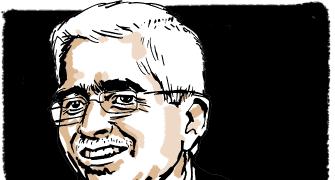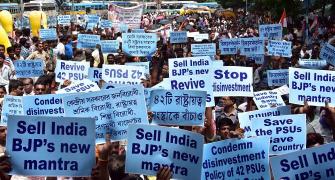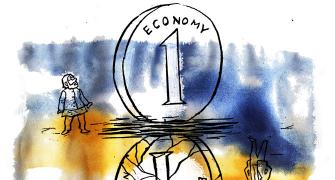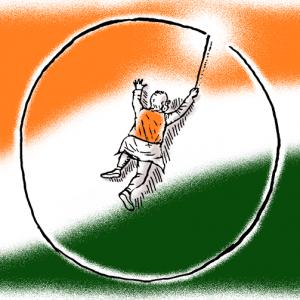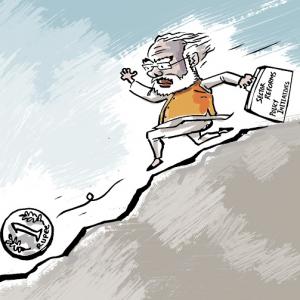'Mere fundamentals will not do the trick,' cautions former commerce secretary Rahul Khullar.

India's economy is in trouble and the government's economic management is under fire.
Unfazed, the mandarins harp on about strong fundamentals.
Even if we were to shed our disbelief, the outstanding question remains: What' the strategy to revive the economy?
Mere fundamentals will not do the trick.
And since 2014, nowhere has the absence of a strategy been more obvious than in external trade.
During 2004-2014, there was an overarching strategy and a policy that underpinned it: Increase economic integration with the rest of the world, reduce protection and tariffs, and promote competitiveness of industry and exports.
Free trade agreements (FTAs) and comprehensive economic partnership agreements (CEPAs) intertwined trade and foreign policy objectives.
By 2014, though, somnolence set in.
There has been no semblance of a strategy, much less any meaningful policy.
Yes, there have been mealy-mouthed statements and renaming of export promotion schemes; those do not a strategy or a policy make.
The numbers tell the story.
Merchandise exports and imports grew at 17.3% and 19.1% per annum, respectively, during the decade from 2003-2004.
The annual growth rates for the five years since 2013-2014 are 0. 9% (exports) and 2.7% (imports).
Trade was expanding till the setback of the Great Recession; and quantitative easing helped a bit thereafter.
So, good luck or right strategy at the right time, take your pick.
In contrast, over the past five years, the government seems to have just surrendered -- hand-wringing about the 'adverse' external environment.
How true is that? Exports from Asia grew by 20% in these five years and some countries did even better.
Bangladesh's garment exports grew by 40% in these five years.
In 2018 alone, Malaysia and Vietnam posted export growth rates of 14% and 15%, respectively.
Truth be told, there was no foreign trade policy, only manna from heaven: The oil price crash.
The sharp contraction in the trade balance nurtured complacency: External trade was not a problem.
Regrettably, Dutch-disease consequences were not even anticipated.
The real exchange rate appreciated and exports plateaued without eliciting any policy response.
The Make in India initiative was fashioned to increase manufacturing and employment - a New Deal on manufacturing.
Unfortunately, Make in India remained a slogan; it neither boosted manufacturing nor employment.
When it was launched, there were apprehensions that it was a blast from the past -- modern-day import substitution.
Sadly, those fears are coming true.
The past few years have witnessed a steady increase in protection.
First came the minimum import prices for iron and steel products (2016).
Then followed import duty hikes in July and September 2018 across a swathe of products, some clearly to benefit favoured sons.
The July 2019 Budget increased tariffs on 75 items including gold.
The objective: To promote domestic manufacturing!
In short, the strategy to steadily reduce tariffs has been emphatically reversed.
So, even as there has been no articulation of a foreign trade policy, the underlying mindset stands revealed.
The commerce minister's recent statement that the goal was 'to curb imports and hence CAD' is confirmation, if any was needed.
The trade balance and the current account deficit (CAD) are not merely a function of exchange rates and fiscal deficits.
Domestic distortions and policy inaction lie behind large CADs.
Over the last five years, there has been little action to tackle these policy distortions.
Coal imports in 2018-2019 were $26.2 billion, a 60% increase over 2013-2014 levels.
Coal accounts for over 5% of our total imports; domestic coal production barely meets 60% of our requirements.
Look at the tragedy in higher education. India now pays $21 billion per annum for overseas education -- the amount has doubled in less than five years.
The import of electronic items increased by 70% in five years to a whopping $56 billion in 2018-2019.
Imports of pharma and chemicals have a similar story.
The unconscionable neglect of exports and the external sector has impacted competitiveness, productivity and gross domestic product growth.
Worse yet, new vulnerabilities are now apparent.
First, the peak trade deficit was $190 billion in 2011-2012; in 2018-19, it was $184 billion, much higher than $136 billion in 2013-2014.
Worryingly, the trade balance has deteriorated by 70% in just two years.
Second, net oil imports were $101 billion in 2013-2014; in 2018-19, they crossed $94 billion -- almost double the level in 2015-2016.
India is almost back to square one, notwithstanding the low oil prices.
The reprieve in oil prices has been one more missed opportunity.
Third, the invisibles are also under pressure.
Remittances have grown by 1.5% per annum in the five years since 2013-2014; the corresponding number for net miscellaneous services (think information technology) is 3.5%.
And the net investment income deficit has grown by 5.8% per annum in the same five years; it was a drain of $31 billion in 2018-2019.
The outcome: We are now even more dependent on remittances and miscellaneous services to keep the CAD within manageable limits.
The exit from the Regional Comprehensive Economic Partnership has received extensive coverage.
However, the government seems to be making a virtue of what was a necessity.
No foreign trade strategy or policy to speak of; little by way of corrective action to address domestic policy distortions; a back-to-the-past revealed preference.
Any surprise that we could not sign up? Houston, we have a problem.
Rahul Khullar is a former commerce secretary, Government of India.


